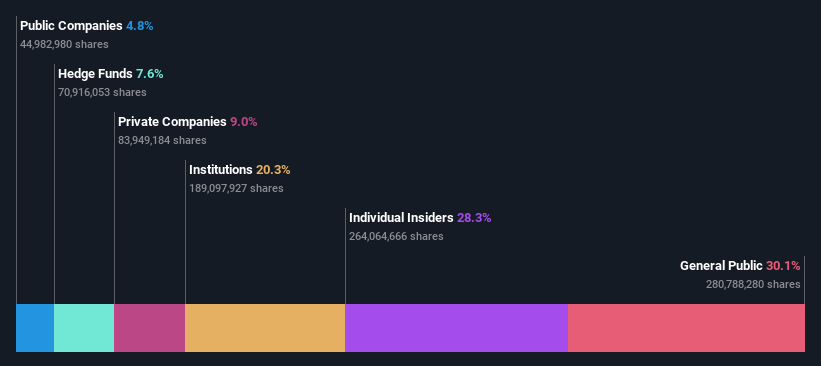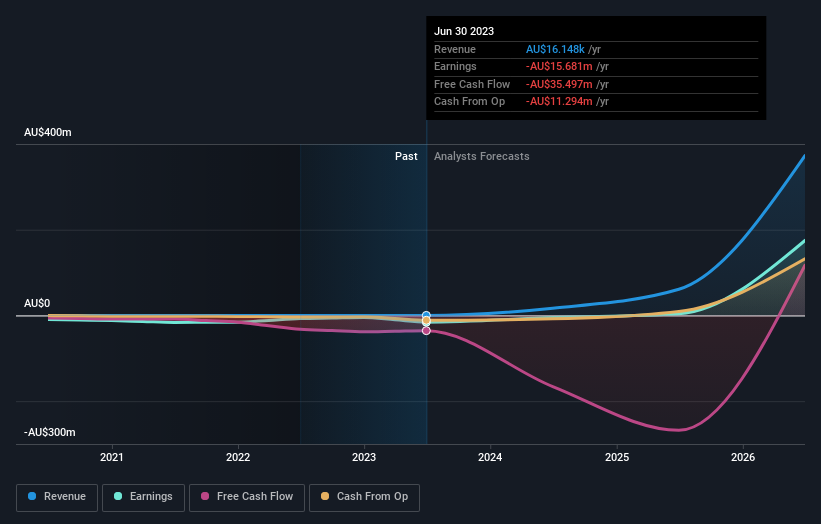Stock Analysis
Alpha HPA Limited's (ASX:A4N) 11% gain last week benefited both individual investors who own 30% as well as insiders

Key Insights
- Alpha HPA's significant individual investors ownership suggests that the key decisions are influenced by shareholders from the larger public
- A total of 8 investors have a majority stake in the company with 50% ownership
- 28% of Alpha HPA is held by insiders
Every investor in Alpha HPA Limited (ASX:A4N) should be aware of the most powerful shareholder groups. The group holding the most number of shares in the company, around 30% to be precise, is individual investors. That is, the group stands to benefit the most if the stock rises (or lose the most if there is a downturn).
While individual investors were the group that benefitted the most from last week’s AU$84m market cap gain, insiders too had a 28% share in those profits.
Let's take a closer look to see what the different types of shareholders can tell us about Alpha HPA.
Check out our latest analysis for Alpha HPA

What Does The Institutional Ownership Tell Us About Alpha HPA?
Many institutions measure their performance against an index that approximates the local market. So they usually pay more attention to companies that are included in major indices.
As you can see, institutional investors have a fair amount of stake in Alpha HPA. This implies the analysts working for those institutions have looked at the stock and they like it. But just like anyone else, they could be wrong. If multiple institutions change their view on a stock at the same time, you could see the share price drop fast. It's therefore worth looking at Alpha HPA's earnings history below. Of course, the future is what really matters.

It looks like hedge funds own 7.6% of Alpha HPA shares. That's interesting, because hedge funds can be quite active and activist. Many look for medium term catalysts that will drive the share price higher. Our data shows that Norman Seckold is the largest shareholder with 14% of shares outstanding. With 7.6% and 6.6% of the shares outstanding respectively, Regal Partners Limited and Macquarie Group, Ltd., Banking & Securities Investments are the second and third largest shareholders. Furthermore, CEO Rimas Kairaitis is the owner of 1.7% of the company's shares.
On further inspection, we found that more than half the company's shares are owned by the top 8 shareholders, suggesting that the interests of the larger shareholders are balanced out to an extent by the smaller ones.
While studying institutional ownership for a company can add value to your research, it is also a good practice to research analyst recommendations to get a deeper understand of a stock's expected performance. There is a little analyst coverage of the stock, but not much. So there is room for it to gain more coverage.
Insider Ownership Of Alpha HPA
While the precise definition of an insider can be subjective, almost everyone considers board members to be insiders. The company management answer to the board and the latter should represent the interests of shareholders. Notably, sometimes top-level managers are on the board themselves.
Most consider insider ownership a positive because it can indicate the board is well aligned with other shareholders. However, on some occasions too much power is concentrated within this group.
Our most recent data indicates that insiders own a reasonable proportion of Alpha HPA Limited. Insiders own AU$231m worth of shares in the AU$817m company. We would say this shows alignment with shareholders, but it is worth noting that the company is still quite small; some insiders may have founded the business. You can click here to see if those insiders have been buying or selling.
General Public Ownership
With a 30% ownership, the general public, mostly comprising of individual investors, have some degree of sway over Alpha HPA. While this group can't necessarily call the shots, it can certainly have a real influence on how the company is run.
Private Company Ownership
We can see that Private Companies own 9.0%, of the shares on issue. Private companies may be related parties. Sometimes insiders have an interest in a public company through a holding in a private company, rather than in their own capacity as an individual. While it's hard to draw any broad stroke conclusions, it is worth noting as an area for further research.
Public Company Ownership
It appears to us that public companies own 4.8% of Alpha HPA. This may be a strategic interest and the two companies may have related business interests. It could be that they have de-merged. This holding is probably worth investigating further.
Next Steps:
It's always worth thinking about the different groups who own shares in a company. But to understand Alpha HPA better, we need to consider many other factors. Case in point: We've spotted 2 warning signs for Alpha HPA you should be aware of, and 1 of them is a bit concerning.
Ultimately the future is most important. You can access this free report on analyst forecasts for the company.
NB: Figures in this article are calculated using data from the last twelve months, which refer to the 12-month period ending on the last date of the month the financial statement is dated. This may not be consistent with full year annual report figures.
Valuation is complex, but we're helping make it simple.
Find out whether Alpha HPA is potentially over or undervalued by checking out our comprehensive analysis, which includes fair value estimates, risks and warnings, dividends, insider transactions and financial health.
View the Free AnalysisHave feedback on this article? Concerned about the content? Get in touch with us directly. Alternatively, email editorial-team (at) simplywallst.com.
This article by Simply Wall St is general in nature. We provide commentary based on historical data and analyst forecasts only using an unbiased methodology and our articles are not intended to be financial advice. It does not constitute a recommendation to buy or sell any stock, and does not take account of your objectives, or your financial situation. We aim to bring you long-term focused analysis driven by fundamental data. Note that our analysis may not factor in the latest price-sensitive company announcements or qualitative material. Simply Wall St has no position in any stocks mentioned.
About ASX:A4N
Exceptional growth potential with mediocre balance sheet.

